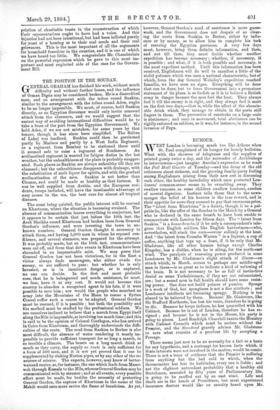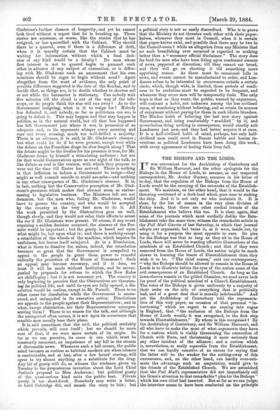RUMOUR.
WEST London is becoming much too like Athens when St. Paul complained of its hunger for hourly bulletins. What with the showers of telegrams and the supplies of printed gossip twice a day, and the surrender of Archbishops to interviewers—just imagine Anselm's expression as he reads the Pall Mall Gazette of Tuesday—and the decay of the old reticences about sickness, and the growing family-party feeling among Englishmen arising from their new zest in discussing each other, the healthy incredulity which once protected Lon- doners' common-sense seems to be crumbling away. They swallow rumours as some children swallow bonbons, careless of mental digestion. Instinct tells them that to the news- monger the belief of his hearers is the true reward, and in their appetite for news they consent to pay that enormous price. The "latest from Khartoum" is a dainty, though it be a pal- pable lie, like the offer of the Soudan to the Mahdi by a General who is declared in the same breath to have been unable to communicate with London for fifteen days. The "latest from Suakim " is a bonne-bouche,if it be only a correspondent's tele- gram that English soldiers, like English harvestmen—who, nevertheless, will stack the corn—swear sullenly at the heat. And "the latest from Coombe Warren' is a liqueur, a cup of coffee, anything that tops up a feast, if it be only that Mr. Gladstone, like all other human beings except Charles Kingsley, has a dislike, when he is ailing, for the north-east wind. The paralysis of reasoning power produced in some Londoners by Mr. Gladatone's slight attack of illness—an attack which, in March, occurs to perhaps one middle-aged man in three—is so great as to indicate a kind of softening of the brain. It is not necessary to be as full of instinctive denial as some Yorkshiremen, if they are not calumniated, are ; but a sound man in full health should have some resist- ing power. One does not build palaces of pumice. Sponge is a work of God, but sponginess is not a fine attribute ; and Londoners' intellects are becoming spongy. Nothing is too absurd to be believed by them. Because Mr. Gladstone, like Sir Stafford Northcote, has lost his voice, therefore he is going to die. Because he keeps indoors, he has quarrelled with his Cabinet. Because he is out of London, therefore he has TO-. signed ; and because he is not in the House, his party is going to pieces. Lord Randolph Churchill taunts the Ministry with Cabinet Councils which must be useless without the Premier, and the Standard gravely advises Mr. Gladstone to save what remains of a precious life by accepting a Peerage.
There seems just now to be no necessity for a fact as a basis for any hypothesis, and a contempt for known facts which, if State interests were not involved in the matter, would be comic. There is not a trace of evidence that the Premier is suffering from anything but the bad cold to which, when the thermometer has lost its habitudes, every one is liable ; and not the slightest antecedent probability that a healthy old Scotchman, annealed by fifty years of Parliamentary life, is going to be snuffed out by an east wind. Life and death are in the hands of Providence, but most experienced insurance doctors would like an annuity based upon Mr.
Gladstone's further chances of longevity, and yet he cannot look tired without a report that he is breaking up. Those stories are nonsense, or worse, like the stories that he has resigned, or has quarrelled with the Cabinet. Why should there be a quarrel, even if there is a difference of drift, when it is morally certain that the Cabinet must be waiting for information without which a final deci- sion of any kind would be a fatuity Do men whose first interest is not to quarrel begin to pummel each other in advance of any subject of contention, or is differ- ing with Mr. Gladstone such an amusement that his own nominees should be eager to begin without need Apart altogether from the want of evidence, the only point of possible difference suggested is the fate of the Soudan, and to decide that, as things are, is to decide whether to shorten sail or not while the barometer is stationary. Can nobody wait five minutes till the cloud is out of the way of the tele- scope, or do people think the star will run away As to the Government resigning, what is it to resign for ? Nobody has defeated it, and nobody, so fax as politicians can see, is going to defeat it. This may happen and that may happen in polities, as in the natural world, but all that has happened has left Government just where it was, in possession of an adequate and, as its opponents whisper every morning and roar out every evening, much too well-drilled a majority. There is no advance, it is said, in Mr. Gladstone's absence ; but what could he do if he were present, except wait while the debate on the Franchise drags its slow length along ? That the debate might be the livelier for his presence is true, for Mr. Gladstone forms by himself a stimulating audience ; but not for that would Conservatives spare us one night of the talk, as Me debate as veal is like venison, with which they propose to wear out the time till Easter has arrived. There is nothing in that infliction to induce a Government to resign—they might as well commit suicide to avoid ear-ache—and nothing in any other consequence of Me. Gladstone's absence. It is, in fact, nothing but the Conservative perception of Mr. Glad- stone's greatness which makes that absence seem so embar- rassing to legislative business. The Ministers left are not dummies, but the men who, failing Mr. Gladstone, would have to govern the country, and who would be accepted by the country as the very best men to do it. All the work permitted by the Obstructives goes on well, though slowly, and they would not relax their efforts to arrest the car if Mr. Gladstone were present. Of course, if any event requiring a sudden decision occurred, the absence of the Pre- mier would be important ; but the gossip is based not upon what might be, but upon what is ; and there is nothing except a retardation of the wheels of the machine, which impairs its usefulness, but leaves itself uninjured. As to a Dissolution, what is there to dissolve for, unless, indeed, the retardation becomes so great that the Government is compelled to appeal to the people to grant them power to remodel radically the procedure of the House of Commons? Such an appeal may become necessary, and if it does, we trust it will be made without hesitation, and be accom- panied by proposals for reform to which the New Rules are child's-play ; but it is not necessary yet. The country is only beginning to perceive that the Obstructives are threaten- ing its political life, and until its eyes are fully opened, a dis- solution would be useless, except to Mr. Parnell. There is no other cause for dissolution while the Government is uncen- sured, and unimpeded in its executive action. Dissolutions are appeals to the people against their Representatives ; and in what, except obstruction, are their Representatives misrepre- senting them There is no reason for the talk, and although the unexpected often occurs, it is not upon its occurrence that sensible men usually base their plans. It is said sometimes that the evil, the political credulity which prevails, will cure itself ; but we should be more sure of that, if we were more certain of its origin. So far as we can perceive, its cause is one which must be constantly recurrent, an impatience of any lull in the stream of discussable news. Whenever such a lull occurs, the public mind becomes as restless as habitual smokers are when tobacco is unattainable, and at last, after a few hours' craving, will agree to try almost anything as a substitute for the drug. Any bit of gossip will do, as witness the credence given on Tuesday to the preposterous invention about the Lord Chief Justice's proposal to Miss Anderson ; but political gossip of the quasi-serious kind suits the public best. Private gossip is too short-lived. Somebody may write a letter, as Lord Coleridge did, and smash the story to bits ; but
a political story is not so easily discredited. Who is to prove that the Ministry do not threaten each other with their paper- knives, whenever they meet in Council, when it is certain that paper-knives exist, and possible that there may be two in the Council-room? while an allegation from any Minister that no such brandishing ever occurred is regarded as nothing better than a "necessary official disclaimer." The story does for food for men who have been living upon condensed essence of news, peppered at discretion, till they cannot eat bread, and they will go on chewing it till something more appetising comes. As there must be occasional lulls in news, and events cannot be manufactured to order, and Lon- doners refuse to be interested in occurrences outside a certain circle, which, though wide, is limited, these periods of readi- ness to be credulous must be expected to be frequent, and whenever they occur men will be temporarily fools. The only hope is that as they recur, the public, warned by experience, will contract a habit, not unknown among the less civilised races, of wondering without believing, and so retain its sources of enjoyment without paying for them in such idiotic blunders. The Hindoo habit of believing the last new story against Government, and being comfortably " cruddled " by it, and nevertheless doing nothing in consequence, would exactly suit Londoners just now, and they had better acquire it at once. It is a half-civilised habit of mind, perhaps, but only half- civilised men could revel in Bazaar babble and harem in- ventions as political Londoners have been doing this week, with every appearance of feeling their lives full.



































 Previous page
Previous page